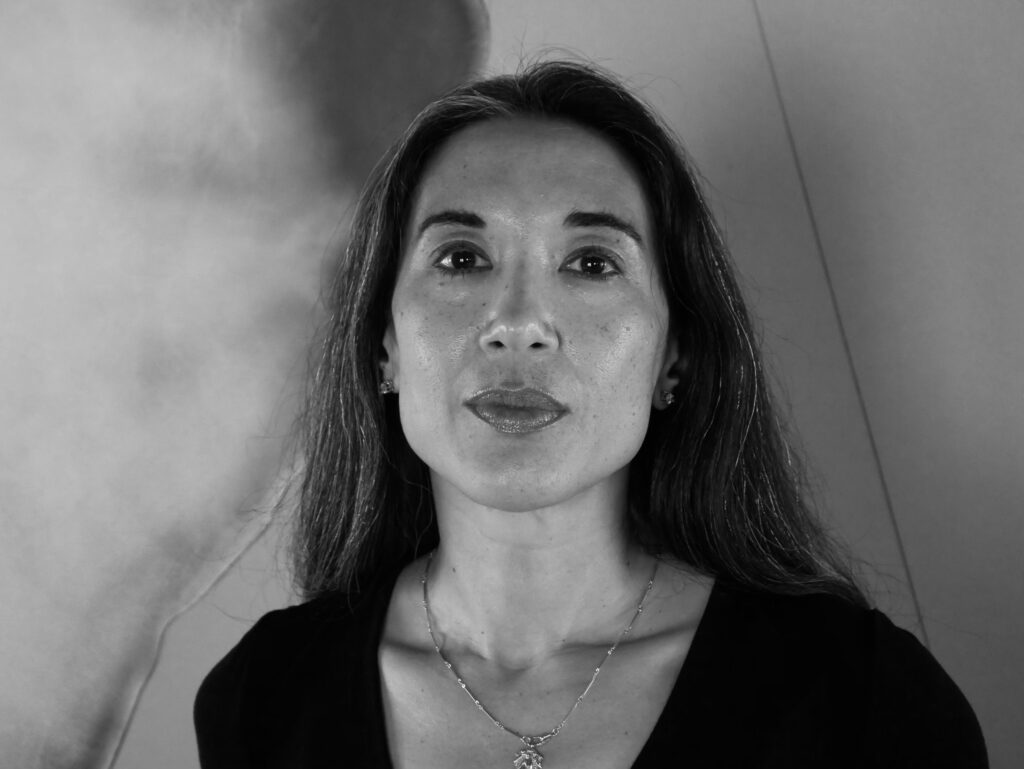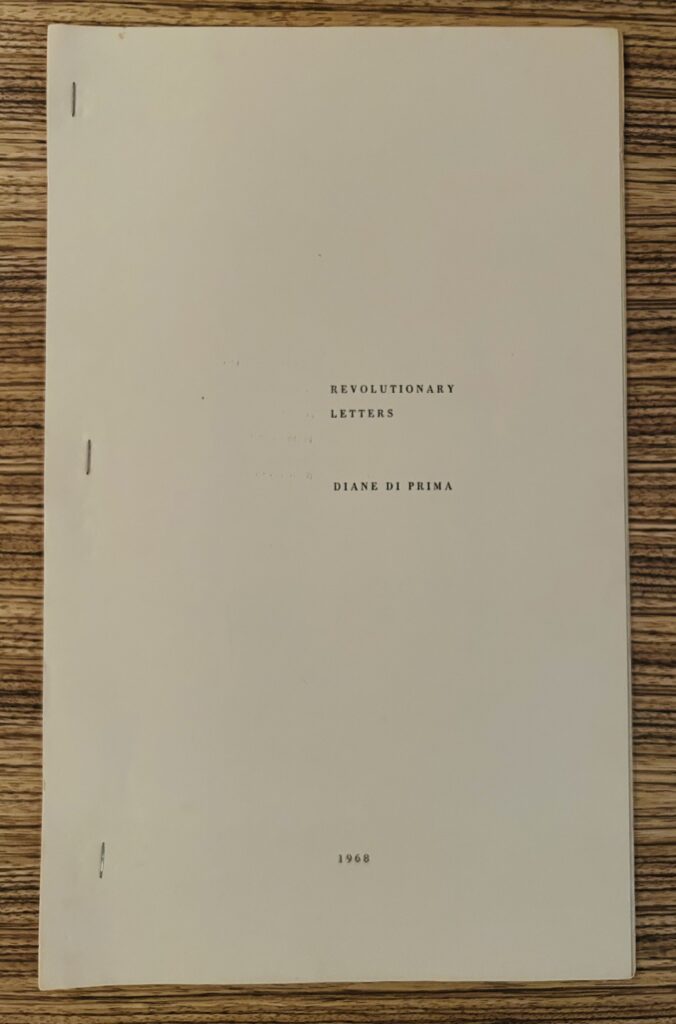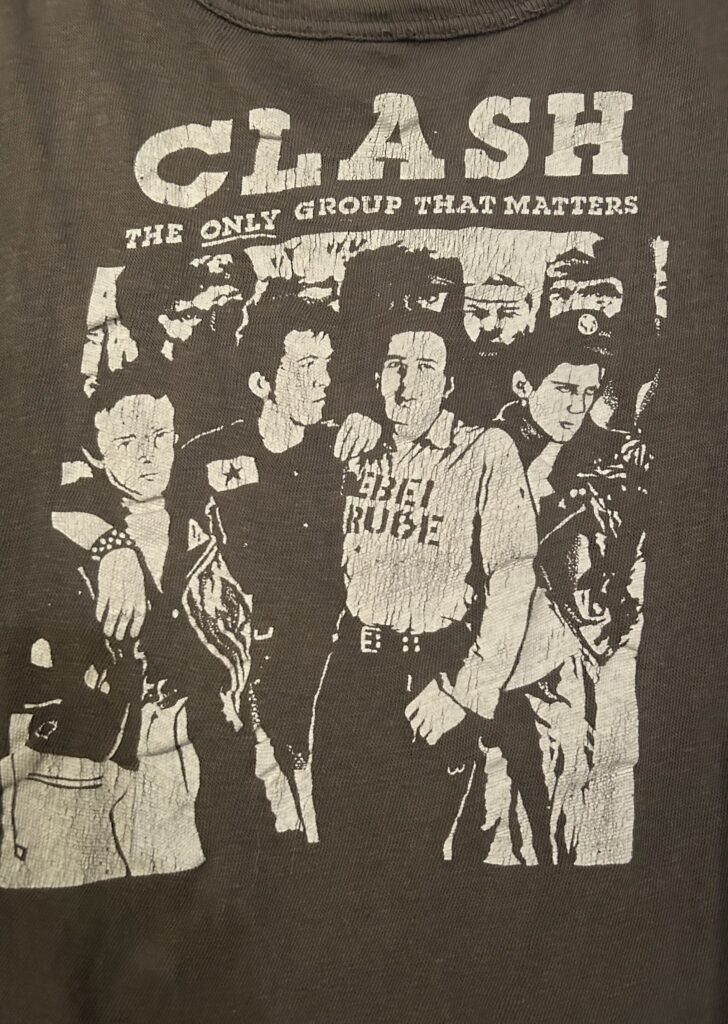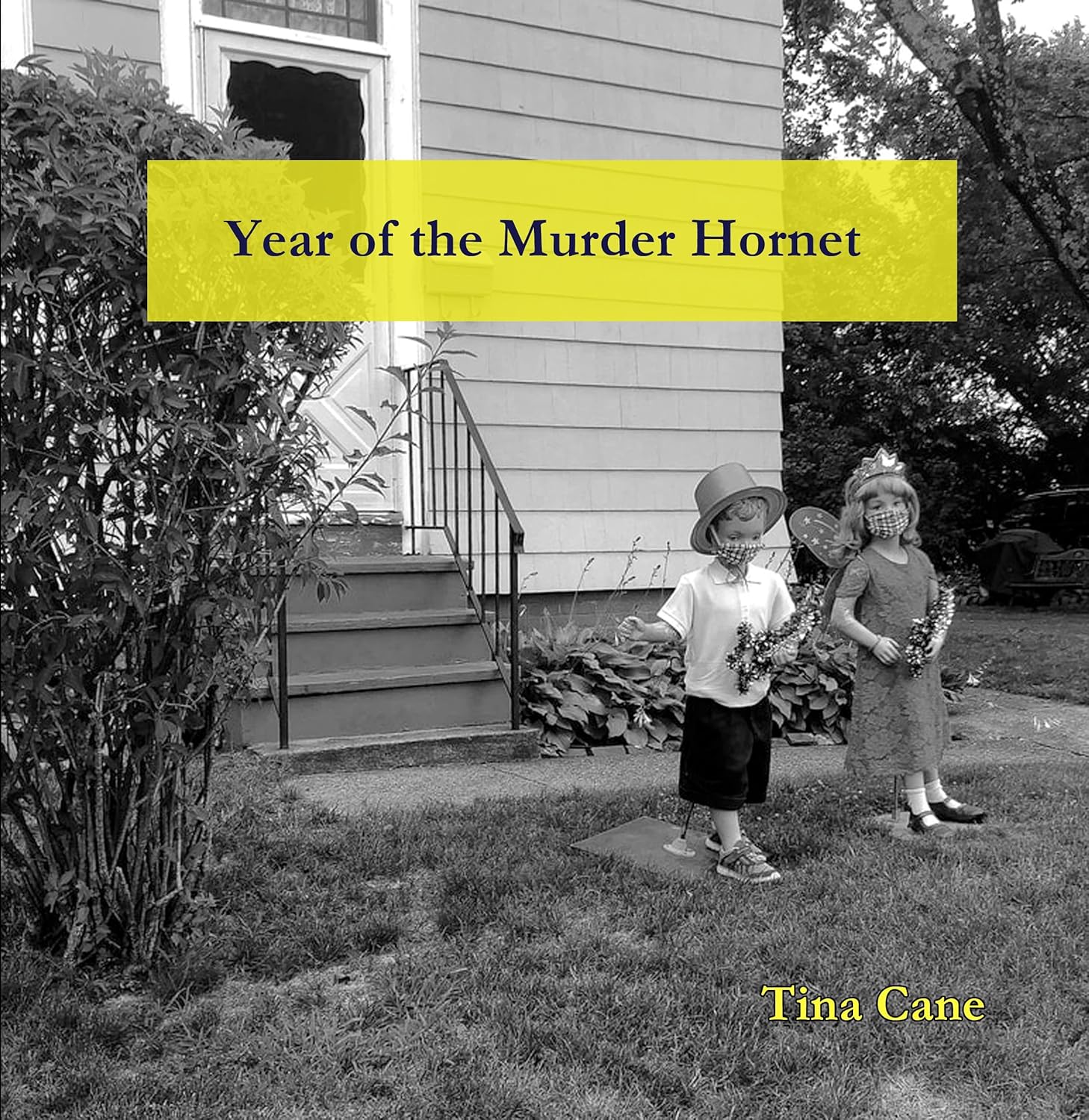By TINA CANE

Photo of Tina Cane by Cormac Crump
On DEAR DIANE: LETTERS FOR A REVOLUTIONARY
Between May 1968 and December 1971, poet Diane Di Prima wrote a poetry collection comprised of sixty-three “Revolutionary Letters.” Several years ago, I purchased a rare set of the first thirty-four of Di Prima’s letter poems—typed on long sheets of construction paper, stapled, and hand-corrected in ballpoint pen. Bought as a celebratory gift for myself, after having been awarded a fellowship, it’s a humble yet fierce extravagance. While the booklet appears sturdy, its yellowed pages are somewhat delicate. I rarely handle it—too worried about spilling coffee, or having someone in my house mistake the unassuming bundle for recycling. Most of the time, my sheath of Di Prima poems sits in my bookcase, atop a row of books by Marguerite Duras.
On January 20, 2025, however, I was moved to retrieve the collection from its shelf. It was inauguration day, and I couldn’t bear to watch or listen to the alleged “festivities.” I wanted to acknowledge what was happening, without being subjected to the spectacle. Reflexively, I reached for “Revolutionary Letters.” It was galvanizing to spend time with Di Prima’s raucous exhortations, but also disconcerting, as I wrestled with my own sense of helplessness.
Unlike James Baldwin’s work—much of which still addresses persistent conditions—“Revolutionary Letters” feels situated in a distinctly other era. Its spirit of resistance possesses a simplicity that feels unattainable today. I’d even say it even verges on nostalgic, if that didn’t sound so distant and disheartening. Regardless, Di Prima’s message retains a sense of buoyant urgency. A call to action with actual instructions, her letters encourage a more instinctive reflex of rebellion.

Photo courtesy of the author.
I went to bed that night struggling to accept the day’s events, and trying to digest the messages in Di Prima’s poems. The next morning, I woke up, made coffee, and gnashed my teeth on the fact that our country had entered a vulgar new reality. Too disgusted to turn on the radio or read the paper, I sat down at the dining table and wrote a letter to Diane. And then I wrote another. And another. I spent the next six days writing poetic responses to each of her thirty-four letters in the folio. I barely remember writing them, but I do recall making a conscious effort to stay loose. I may have even said the words out loud at one point. I wasn’t much interested in thinking—so much as responding, tapping in. I wanted the writing experience to feel like an exchange, as I grappled with a desire to resist, my own passivity, sense of complicity, and my utter lack of an actual plan.
After six days of single-mindedly composing my “Dear Dianes,” I took a rest and read them. They captured my brewing concerns, but the cycle needed another thread—to “alleviate the tension on the voice,” as my friend, Sean Singer, put it. Since I had been recently taking notes for an essay about The Clash, I had the impulse to weave my reflections on the band into the poems. The resulting “postscripts” to these epistles incorporate aspects of The Clash, for the band’s ethos of rebellion and revolution. This felt apt, since my discovery of them, at age thirteen, was my first conscious experience of art as resistance, at least on terms I understood. The Clash’s lyrics awakened me to issues of class, inequality, political brutality, and capitalism beyond the confines of my own experiences. Growing up in downtown New York during the 1970’s and 80’s—down the block from Allen Ginsburg, and in Di Prima’s old stomping grounds. I may have been smack in the middle of counter-culture but was too young and in its midst to recognize it.
The Clash introduced me to terms like Sandinista and places like Santiago Stadium, which carried meanings and histories that were foreign to me, but whose weight felt urgent and universal. Listening to homemade cassettes on my Walkman—recorded from scratched-up albums on my stereo set—I wanted to understand and be connected to struggles different from my own. The music, the references, and emotional range reverberated in lasting ways that forever broadened my curiosity. They also made me more conscious of tensions and conditions closer to home.
If The Clash stirred up rebellion in me, Diane Di Prima’s poetry made me aware of a whole tradition—a lineage of creative resistance that transcends era, country, and culture—that flows from a shared spirit of skeptical inquiry and aspiration. I didn’t grow up to be a revolutionary, but I did go on to make poems—having learned that art is a bridge which connects us to each other through time and space. I wrote DEAR DIANE from that place—to commune, as a gesture of shared humanity, as an effort towards solidarity.
–Tina Cane

Photo courtesy of the author.
DEAR DIANE #1
I have just realized the stakes and that I don’t have
what it takes to be a revolutionary take last night
I filled up the tub like you advise at the first sign
of trouble in case they cut off the water like they did
in Newark 1967 admittedly I was late to the game
but then all I did was get in with my book no less!
then was too despondent over the new news to even read
simply sat there thinking about tribe crew community
and the healing powers of salt wondering how on earth
to keep my children warm with just my breath
DEAR DIANE #2
I’m keeping it simple like Mary says she’s not
a revolutionary except in the intellectual sense
our Emily Dickinson history will be the judge of that
but if history is forever run by men then maybe not
my feeling lately is that keeping it simple can be walking
in the woods something I know how to do which means
if we return as often as leaves like you say I would get
to see my children every day even after I am gone
if I had one revolutionary wish this would be it
but revolutionaries don’t get wishes do they, Diane
P.S.
I used to wish I had a band like The Clash
when I was sixteen I’d sing Complete Control
off-key cruising on my bike down Bleecker Street
past the vegetable stand and Zito’s Bread
You’re my guitar hero and all that
bass pumping blood in my head and chest
DEAR DIANE #3
In her poem Keeping it Simple
Mary separates the bird from its function
feather by feather a humble pursuit
that makes me want to use this metaphor
but where? everywhere I am Mary says
she blows up its scale I agree but she means
the bird whereas I mean the world
DEAR DIANE #4
You are correct when you write
I may have to crash under tension may have
to cool out but I’m out with lanterns and all
my good intentions hoping content moderation
will keep girls safer you say that left to themselves
people are not lazy or afraid but I am afraid
you are mistaken I include myself in this though
I wouldn’t say lazy maybe drained the way Mary
sounded in the last dispatch she sent me a sketch by
her recently deceased beloved My husband drew this
Mary wrote a ladder impossible to ascend? she asked
stairway to heaven was my first thought
my second thought was yes
P.S.
There’s Clampdown by The Clash
and there’s clampdown the circumstance
both sound overly jaunty today
everyone’s too lazy for change
DEAR DIANE #5
Di, it turns out we both love Bonnie and Clyde!
I even wrote a poem about them once when I was young
enough to think maybe that’s what love was two people
on the run with a common purpose but then I grew up
and saw my fair share of blood an energy form is what
you call the stuff I fully understood what you meant after
having children so much energy! so many forms! and now
so much more to learn about birthing a revolution where to begin
P.S.
I’ll leave you with a lullaby:
Revolution rock I am in a state of shock
So bad bad rock this here revolution rock
DEAR DIANE #6
All swords are two-edged is so very true
I wonder if you are good with a gun, D
I don’t own one which makes me less American
than some I do admit I get uptight around knives
especially since that time I had one held to my throat
in an alley while tripping on acid later over eggs
at Kiev I hallucinated Malcolm X eating a sandwich
in his black tie and glasses the Hell’s Angels are also
part of this story but I will save that for another time
let me just say I admire Malcom for his strong
and flexible mind whereas I believe
the Hell’s Angels act mostly out of fear
P.S.
The crowd cheered when Allen Ginsberg
joined The Clash on stage at Bond’s in 1981
Welcome President Ginsberg Strummer said
I don’t like dictatorship Ginsberg chanted
DEAR DIANE #7
Guns are an incidental part of the action
in America today too Diane but they have little
to do with revolution are more an expression
of repressed emotion wrung from lives hollowed
by alienation in your wildest imagination, D
you could not have conceived what we’ve been
dealing with since you’ve left we didn’t win in mantras
or plug into the buddha nature with all our guns
we did plug into oligarchs though and now
I don’t believe those structures will ever fall
P.S.
Anna Akhmatova structured her lines
with a falling intonation so that
the dramatic felt anti-climactic
DEAR DIANE #8
I take that back Diane surely you conceived
of it all before any of it came to pass
mother daughter sister of the revolution
you had a knack for choosing the ground
for a potential battle you didn’t want to stumble
bloody out of Central Park to try to find help
there where the money is didn’t want to be
lured away from the incense and the love-ins
we don’t have love-ins today we live between
the active and the passive in a space called interactive
too abstract to foment revolution of any kind
P.S.
Your advice about not wearing earrings
to a protest makes sense once when I was
taken in a car and robbed the guy’s girlfriend
tried to rip out my hoops that’s how the cops knew
she had served time they called it a prison move
I hope this information isn’t too personal for you
DEAR DIANE #9
I’m charmed that you propose we mimeograph
money that everyone just print what they need
those machines are obsolete but I still remember
sixth grade how every time our teacher handed out
the test we’d hold the paper to our faces and sniff
the faint acid scent of vinegar there was comfort in it
like in the idea of destroying the idea of money of owning
land even keeping time just yesterday Americans learned
trying to overthrow the government is no longer a crime
I wonder what this means to a revolutionary like
you say the day will come when we will have to know
the answers but I’m still stuck on the questions
DEAR DIANE #10
Prescient as ever you see These are transitional years
and here we are entering the Year of the Snake
a period of transformation intuition and clarity
in complex situations talk about capacity and need!
you call America a seed say revolution takes time
and opine in future tense that the dues will be heavy
the wood snake is a symbol of balance and discovery
it’s hard for me not to shut my eyes
P.S.
In 1985 I saw Mick Jones smoking on the corner
of St. Mark’s wearing combat boots and a tux
cut off at the knees as he turned to step
though steam rising from the street it looked
like he was moving through a dream
Tina Cane is the founder/director of Writers-in-the-Schools, RI, and, from 2016-2024, served as the Poet Laureate of Rhode Island, where she lives with her husband and three children. Cane is the author of The Fifth Thought, Dear Elena: Letters for Elena Ferrante, poems with art by Esther Solondz, Once More With Feeling, and Body of Work. She was a 2020 Poet Laureate Fellow with the Academy of American Poets and the creator/curator of the distance reading series, Poetry is Bread, as well as editor of Poetry is Bread: The Anthology. Her most recent poetry collection is Year of the Murder Hornet, and her debut novel-in-verse for young adults, Alma Presses Play was released in September 2021. Her second verse novel for young readers, Are You Nobody Too? was published in August 2024. Tina is also the co-host, with Joey Sweeney, of the forthcoming podcast, Stay Free.



